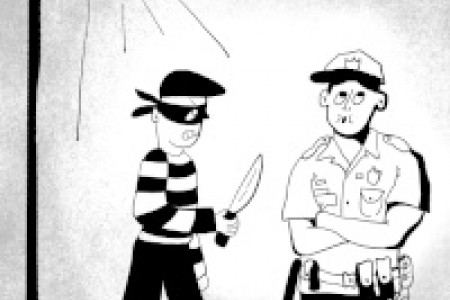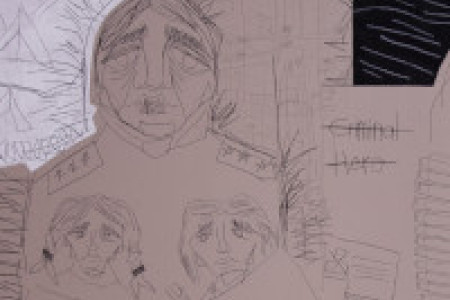‘Peg City proud
Ismaila Alfa talks urban music and the deeper roots of local hip hop culture

ur·ban [ur-buh n]
adjective
1. of, pertaining to, or designating a city or town.
2. living in a city.
3. characteristic of or accustomed to cities; citified; He is an urban type.
It’s not hard to see why many describe urban music, or hip hop, as the “sound of the pavement.” Not only does its vibe elicit the feeling of walking the street, but its lyrics and subject matter proudly reflect the city in which it was made. During the 1980s and ‘90s, such groups as Fermented Reptile, Mood Ruff and Parklike Setting started shaping hip hop culture in Winnipeg – emcees including Pip Skid, mcenroe and Yy spun tales of urban life and brought prairie style on tour around the world.
Ismaila Alfa played an important role in that story. Formerly a member of local crew Frek Sho (Gruf tha Druid, Gumball, Micill Shazzam, Sunil Ishq and Gallivanting Spoof), the current CBC Radio host and frontman of jazz-reggae-rap fusion band Alfa, forever etched his name in Winnipeg’s hip hop history books when, at the age of 16, he got his start taking on other wannabe MCs during a house party rap battle.
“I got on the microphone and realized a whole bunch of other people like to rap here too, because all of a sudden they jumped up to battle me,” he reminisces. “That’s actually how I created my name. I ended up battling some guys and that was it, I was a rapper in Winnipeg.”
But it was a show at the Franco-Manitoban Cultural Centre, at which an invitation to freestyle on stage during a Maestro Fresh Wes set that put the young MC’s name on the map.
“I literally made up everything over these instrumentals they were playing for 5 or 10 minutes. I got off stage and Maestro asked me if it was all freestyle and said it was dope,” he says. “I was on top of the world that night. But little did I know that as soon as I walked out the door I would meet Sunil Bector [Ishq], one of the founding members of Frek Sho, and he asked me if I wanted to be part of a hip hop collective he was creating.
“That’s where I received my rap education and became the artist I am today.”
Alfa believes hip hop in Winnipeg works because it’s the wild card, like many other art forms in the city.
“ The Winnipeg music scene has always been D.I.Y.-focused. From the punk rock scene to the country scene, it’s built on people who want to create an audience, a style, and make it happen.
Ismaila Alfa, rapper
“During the early and mid-’90s, Winnipeg decided it didn’t care that hip hop music was being made in other urban centres - we do things our own way,” he says. “That fit in really well with this province, because Manitoba and the Winnipeg music scene has always been D.I.Y.-focused. From the punk rock scene to the country scene, it’s built on people who want to create an audience, a style, and make it happen. That’s what Frek Sho and Farm Fresh and Different Shades of Black did back in the 1990s. I don’t think we were aware at the time that we were creating these paths or opening these doors for things to happen in the future, but a lot of greatness was compounded in this city.”
The artist also notes that while Winnipeg MCs were well aware of the sounds coming out of New York, L.A. and Atlanta, they realized something was different.
“We were never foolish enough to believe we could emulate that exact same thing and make it work for us as well,” he says. “And we didn’t watch it because it wasn’t telling our story. We would touch on what was going on in the world but through our eyes, the way we see it.
“The other thing we got from the big picture, as far as hip hop goes around the world, was feeling better about being different. Hip hop was an excuse for me to be a freak here in Winnipeg. When a thousand outcasts speak out about how different they are, suddenly they’re not outcasts anymore. And that’s what rap music did for us here. It’s an important thing about hip hop: you’re always representing your area, your community, your region. That’s why it’s almost unacceptable for me to drop in lingo they have in New York. I hear ‘dude’ and ‘two-four’ way more than most words!”
While there is solidarity and variety within Winnipeg’s hip hop scene (Alfa notes that the Aboriginal community has embraced hip hop music more than any other in the last decade) he feels that there are cracks in the collective.
“If you listen to our hip hop station here [104.7 Streetz FM] you’ll hear representation of our communities from all over,” he says. “Our hip hop scene used to be more connected and united – there are some who would argue that – and we all knew what was going on with one another at all times. It seems very segmented now. There isn’t as much of a crew mentality anymore, but like all forms of music, distribution has become a lot different.
“There’s good and bad to it all, but I still see hip hop as a crucial voice for our young people.”
Part of the series: The Urban Issue 2014
Published in Volume 68, Number 25 of The Uniter (March 27, 2014)






